
Prefix Practice Cards (im in pre re un mis dis) by Teach Simple
When we add the prefixes un-, im- and dis- to adjectives, verbs or nouns, we get their opposites. Study the examples given below: Polite x impolite Kind x unkind Able x unable Like x dislike Pleasure x displeasure Believe x disbelieve Shaved x unshaved Perfect x imperfect Satisfy x dissatisfy Pleasant x unpleasant Respect x disrespect Pure x impure
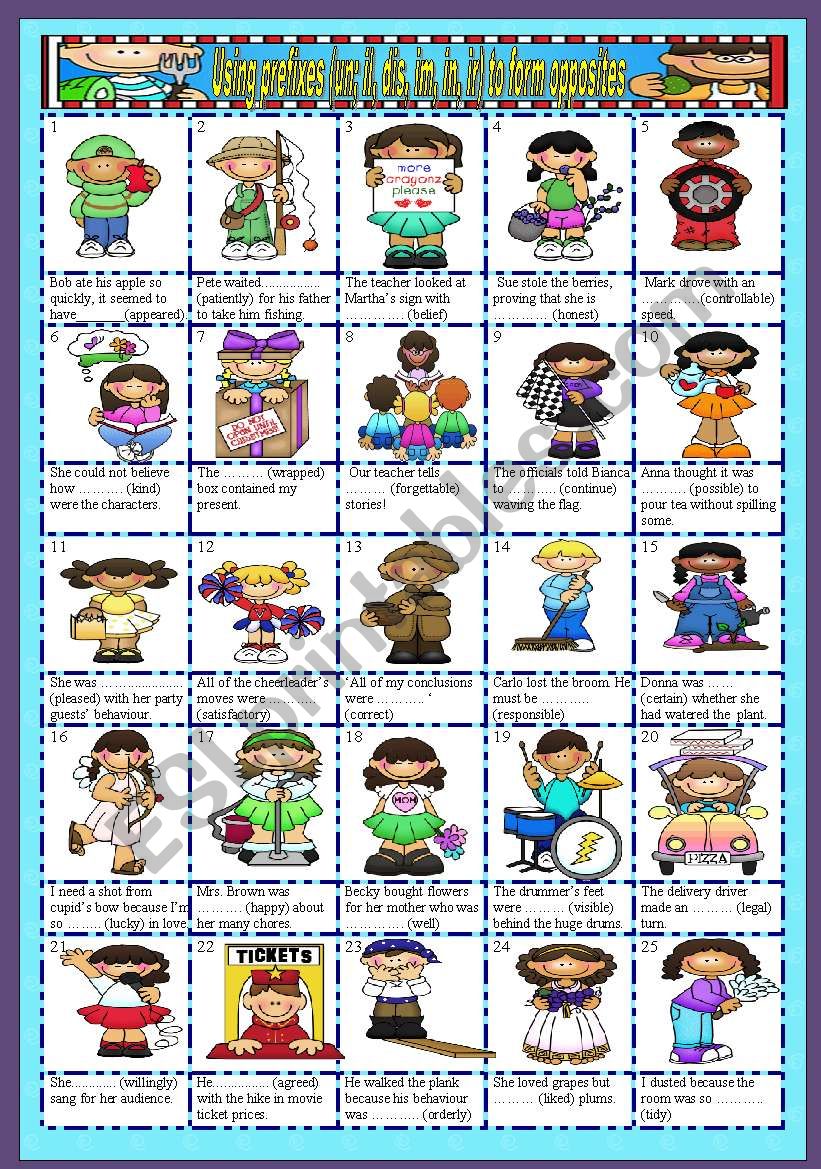
Images of Dis (ENGLISH Version) JapaneseClass.jp
English Grammar Playlist - https://www.youtube.com/playlist?list=PLd1H6c0C6Csu8gd-cIOIKMp0NDGf1LfvoSyllabification - https://www.youtube.com/watch?v=BQpy7GLv.

Pin on Prefix
We use the negative prefixes un- / in- /im- /il- /ir-. For example: John and James are brothers. John is reliable, you can trust him to do anything you ask.James, on the other hand, is unreliable, you cannot rely on him.. By adding un to reliable we change the meaning of the word to not reliable.. Dis gives the adjective the opposite meaning: "I know you all agree with the plan, but I still.
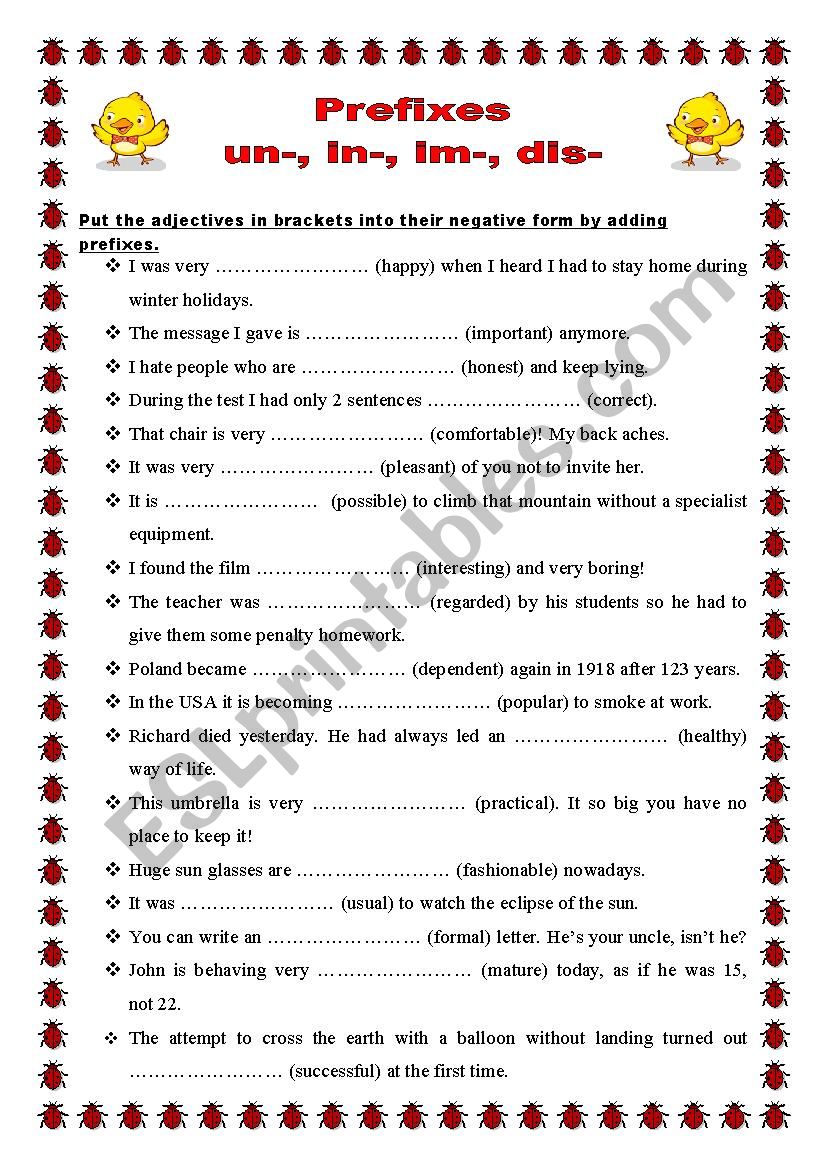
prefixes un and dis
Note that the Latin verbal prefix di(s)-also meant "placed in an orderly pattern", which I believe is the origin of its secondary sense "in opposite or eccentric directions"; this evolved into a sense similar to the secondary senses of a(bs)-, e(x)-, and de-"away"; and I think this sense "away" as opposed to ad-and in-"towards" led to their sometimes being perceived as negative prefixes, even.

PREFIXES un / dis / im / ir / un + KEY ESL worksheet by cagreis
The most common negative prefixes in English are in-, un-, non -, de-, dis-, a-, anti -, im -, il -, and ir-. While some of these prefixes are interchangeable in some uses, there are subtle differences between them. in-, im-, il-, ir-

Antonym List Using "MIS, DIS, UN, IM, IN" Prefixes ESLBUZZ
Unsure when to use "insure"? This grammar lesson on prefixes will help you understand some of the prefixes that are common in English. What is the difference.

Prefixes re, un, dis, pre, mis Quiz Quizizz
dis - in - (or il-, im-, or ir-) mis - non- un - Negative Prefix List: Uses De- is almost always used before a verb, or a word formed from that verb. It means to reverse the verb's action, as in dehydrate, deregulate, or detoxify. (It can have other meanings besides making a verb negative.
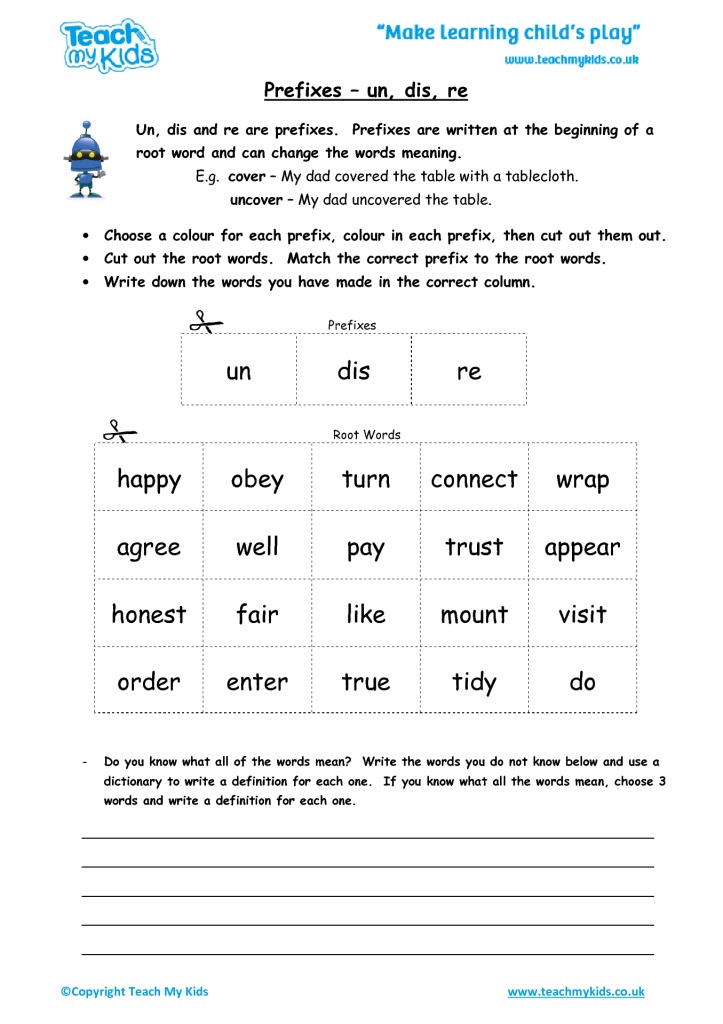
prefixes re un dis worksheets
Here are some English negative prefixes: a-, dis-, il-, im -, in-, ir-, non-, un-. For example, the prefix un- can be attached to the adjective happy to create the negative adjective unhappy. Or you can use the negative adverb not. Note that there is no difference in meaning between these two forms. happy. Tom is not happy.

Prefixes un, dis, mis, re, & pre Word Search WordMint
Prefixes in English - In, Im, Un Prefixes in English are one of the most complicated grammatical aspects to learn. Prefixes like im-, in-, un- can change the entire meaning of a sentance. They are small grammatical changes but with powerful consequences to the meaning of what you intend to say.
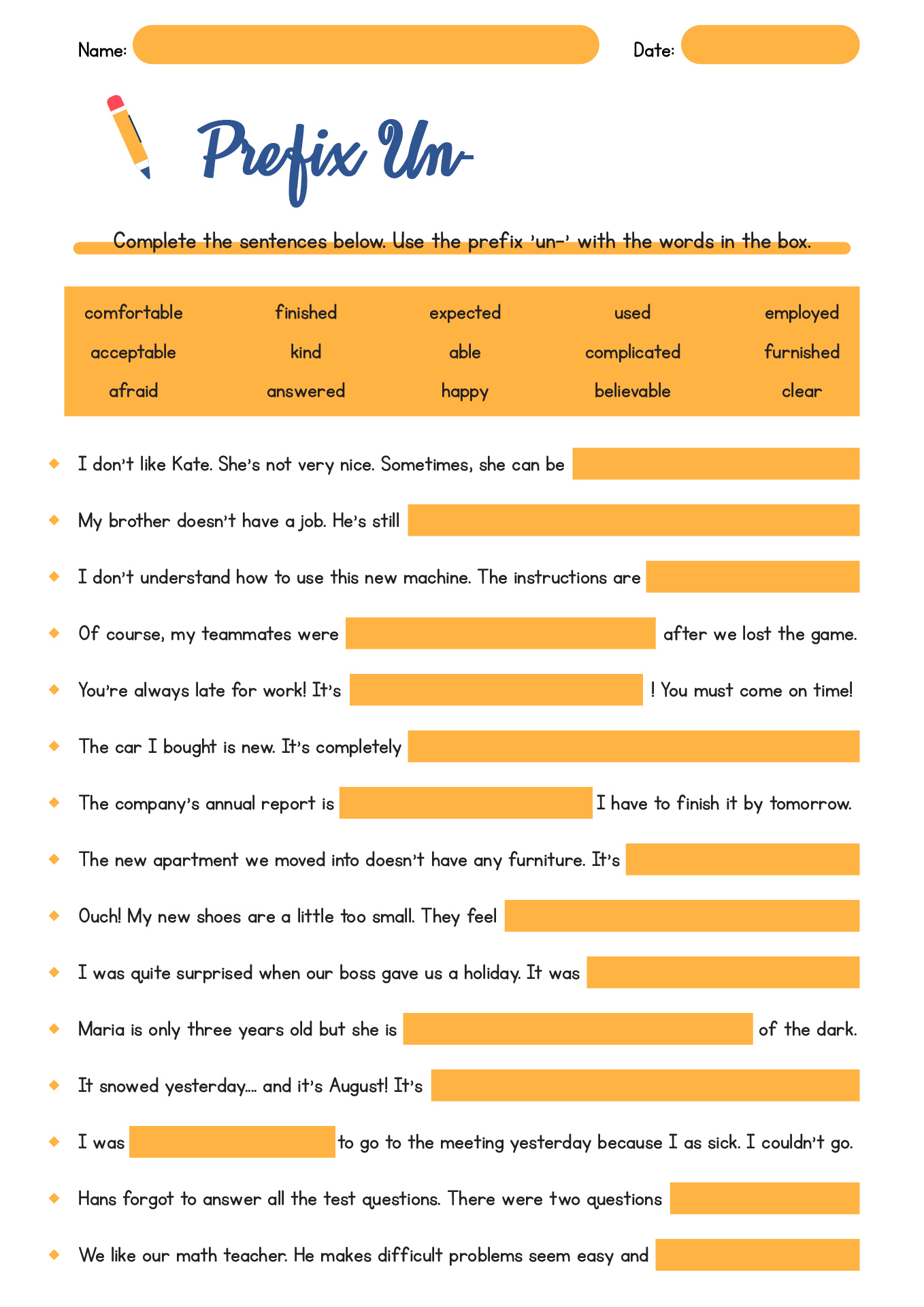
prefix un and re worksheets
Negative prefixes and suffixes - English Grammar Today - a reference to written and spoken English grammar and usage - Cambridge Dictionary

Lesson 10. Word formation. Prefixes of negation (un, in, im, il
The prefix un is commonly used to negate a word, but is is quite rare with words that start with the letter p; the prefix im seems more common. For example: Impossible Implausible Imperfect But there are certain p words whose opposite is prefixed with un, such as: Unpolluted Unpolished Unplugged
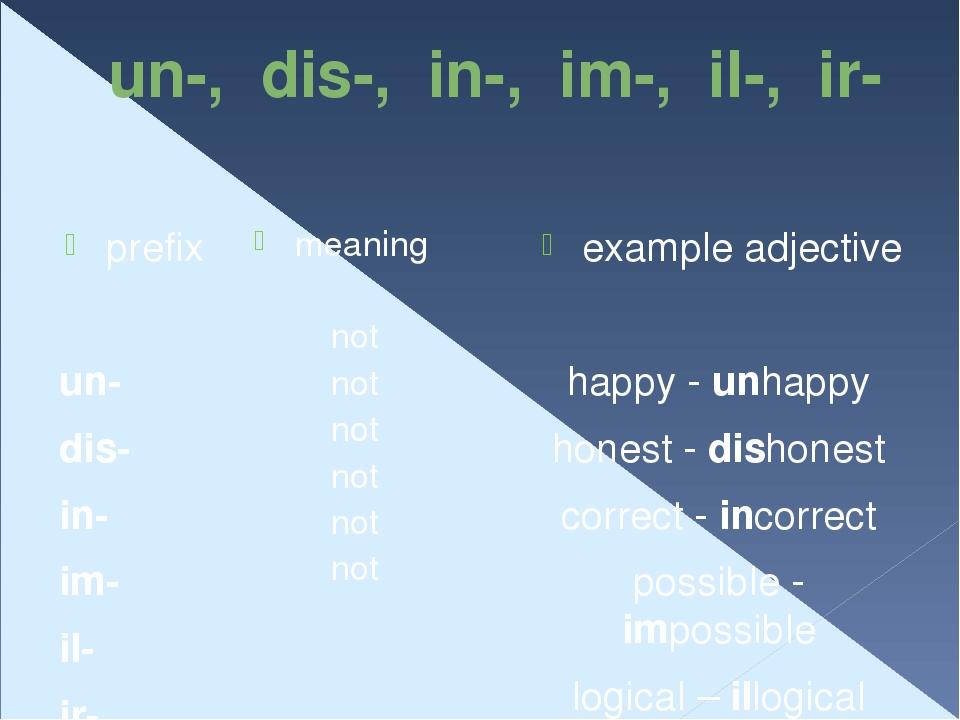
Презентація на тему "NEGATIVE PREFIXES" Презентація. Англійська мова
Spanish. Recommendations. Skill plans. IXL plans. Virginia state standards. Textbooks. Test prep. Awards. Improve your language arts knowledge with free questions in "Words with un-, dis-, in-, im-, and non-" and thousands of other language arts skills.
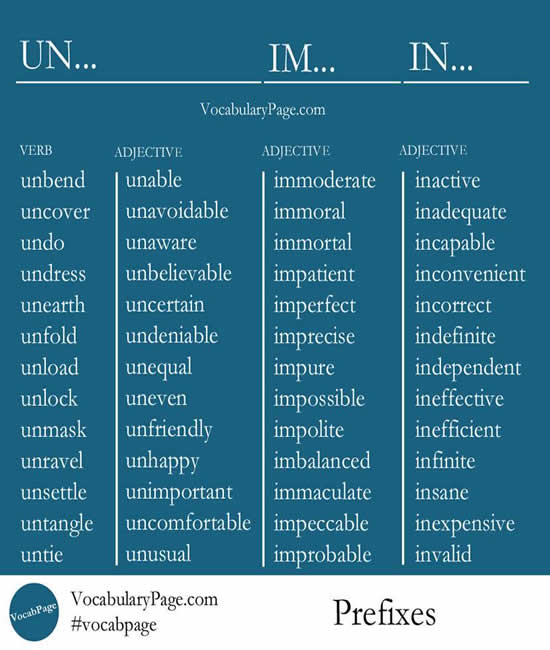
Using Prefix Un, Im, In Vocabulary Home
DIS UN IN IL IM Ir Non Common Prefixes in English English Vocabulary: frequently used prefixes in English. English Vocabulary with Negative Prefixes DIS Disappointment E.g. He found it difficult to hide his disappointment when she didn't arrive. Disapproval E.g. He shook his head in disapproval. Disgust E.g.
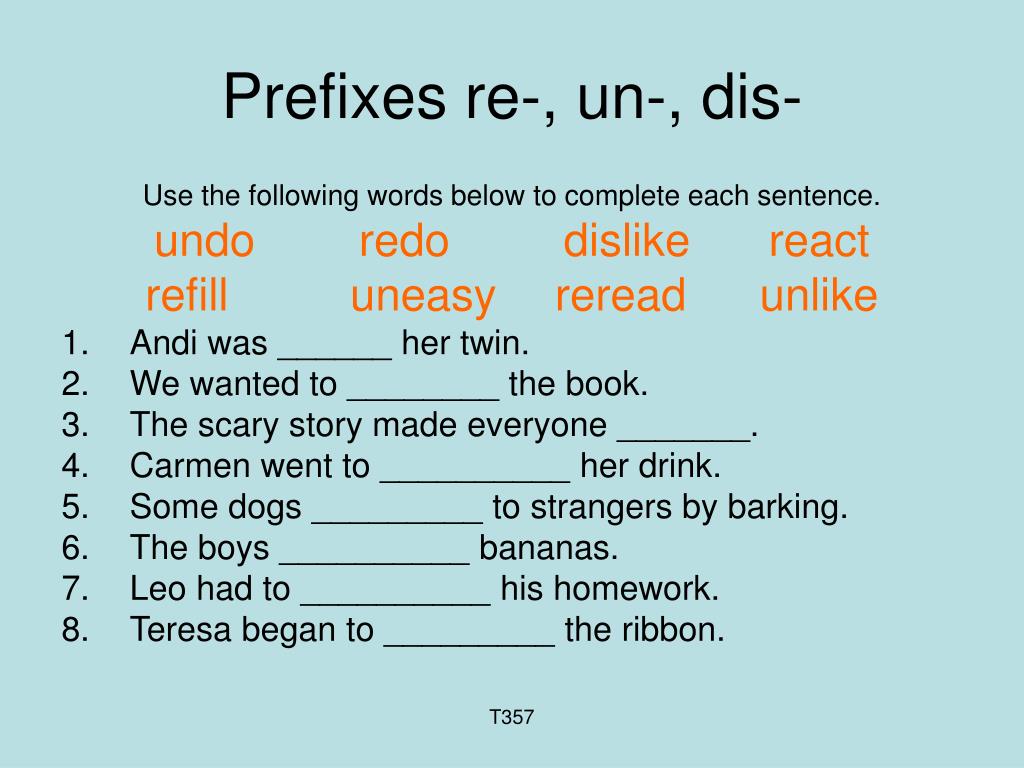
PPT What lessons can you learn from stories about longago or faraway
The word unorganized simply means "the lack of organization." Take similar care when choosing between dis and de. The negative prefix de, like dis, is attached to the beginning of verbs to show the undoing of an action, but it has a different meaning than dis depending on which base word is used. We'll use the word compose as an example.

What are Prefixes? Learn words with Prefixes "un", "im", "dis", "in
Use im- before words stating with m, p and b ~ mature — immature, material — immaterial, perfect — imperfect, balance — imbalance. Exercise. Add a prefix to the following to make the opposite. 1. happy 2. mature 3. legal 4. kind. 5. patient 6. regular 7. fair 8. comfortable. Answers below. Prefixes. How to Spell.

A matching exercise to practise negative prefixes in-, im-, il-, ir-, un-, dis- with adjectives. Key included. Hope you fin…